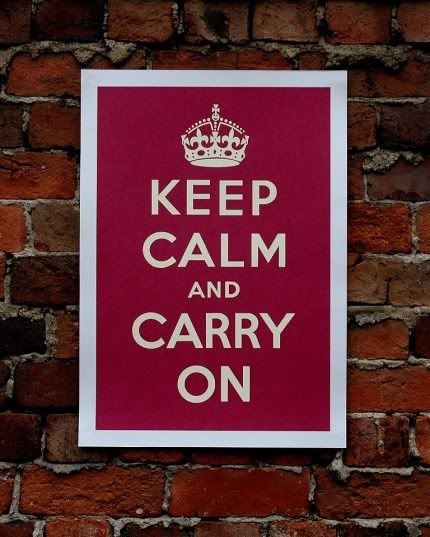
Seems just a touch ironic when almost the whole of his two terms has been dedicated to persuasion through terror.
This poster was comissioned by the British government's Ministry of Information on the eve of their involvement in the war with Germany, and was meant to convey to the public an "attitude of mind" appropriate to the unknown and very dangerous situation they'd confront in the days and years ahead. Mr Bush is well-versed in the rallying cry of a well-timed piece of propaganda, and this country has, up to a point, been agreeable in the face of his decision to use its people as cannon-fodder. Our George, however, is not George VI; there is no Churchill on the horizon. And this is no longer a matter of stoicism and the acceptance of hardships with an eye to the greater good, and the surety that comes from suffering for the common cause. This is a matter of people's money, and I'm thinking it's not going to be a simple matter of telling everyone to buck up this time.
As I listened to the President I was aware of the fact that he wasn't talking to me. He was talking about mutual funds, mortgages, retirement accounts, and credit flow. I have none of those things, am in no danger of losing what I don't have, and so don't really figure into the equation. And it seems that more and more people might be joining me here among the ranks of those who really aren't a part of the fabric of American society. Clearly, to be of matter within it is to be tied to those slips of paper; when you take away a person's money, you take away their reality. Words are cheap to begin with, but even more so now. I'm wondering what words people will be speaking to themselves if they lose even a part of what they always assumed was so solid, if the institutions they believe in fail them. I'm wondering how much they can lose and still function, and what will happen once a little too much is taken away.
In Journey to the End of the Night, Louis-Ferdinand Céline writes about his experiences as a calvary officer in World War One. Early in the story his regiment is shelled by the Germans, his colonel is killed, and he is seriously wounded; somehow he escapes and makes his way to the rear, where he's put to work at a ration distribution point. He's just seen most of his fellow soldiers slaughtered, but remains full of his usual apocalyptic joie de vivre, until he's confronted with the sight of the regiment's butchers at work: "The squadrons were fighting tooth and nail over the innards, especially the kidneys, and all around them swarms of flies such as one sees only on such occasions, as self-important and musical as little birds.
Blood and more blood, everywhere, all over the grass, in sluggish confluent puddles, looking for a congenial slope."
And it's this moment, finally, that proves too much for him; he faints dead away.




No comments:
Post a Comment